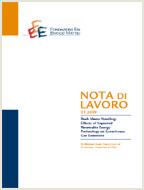Directed Technological Change and Energy Efficiency Improvements

Data
11.09.2015
11.09.2015
Autori
Jan Witajewski-Baltvilks (Fondazione Eni Enrico Mattei); Elena Verdolini (Fondazione Eni Enrico Mattei, Centro Euro-Mediterraneo sui Cambiamenti Climatici CMCC); Massimo Tavoni (Fondazione Eni Enrico Mattei, Politecnico di Milano)
Codice JEL
O31, O33, Q43
O31, O33, Q43
Parole chiave:
Energy Efficiency, Directed Technological Change, Induced Innovations, Patents Econometrics
Energy Efficiency, Directed Technological Change, Induced Innovations, Patents Econometrics
Publisher
Climate Change and Sustainable Development
Climate Change and Sustainable Development
Editor
Carlo Carraro
Carlo Carraro
This paper applies the Directed Technical Change (DTC) framework to study improvements in the efficiency of energy use. We present a theoretical model which (1) shows that the demand for energy is shifted down by innovations in energy intensive sectors and (2) highlights the drivers of innovative activity in these sectors. We then estimate the model through an empirical analysis of patent and energy data. Our contribution is fivefold. First, our model shows that under very general assumptions information about energy expenditures, knowledge spillovers and the parameters governing the R&D process are sufficient to predict the R&D effort in efficiency improving technologies. Second, we pin down the conditions for a log-linear relation between energy expenditure and the R&D effort. Third, the calibration of the model provides clear evidence that the value of the energy market as well as international and inter-temporal spillovers play a significant role in determining the level of innovative activity. Fourth, we show that innovative activity in energy intensive sectors shifts down the (Marshallian) demand for energy. Finally, we show that due to the streamlined modelling framework we adopt, the point estimates from our regression can potentially be used to calibrate any model of DTC in the context of energy consumption.
***
Suggested citation: Witajewski-Baltvilks, J., E. Verdolini, M. Tavoni, (2015), ‘Directed Technological Change and Energy Efficiency Improvements’, Nota di Lavoro 78.2015, Milan, Italy: Fondazione Eni Enrico Mattei
